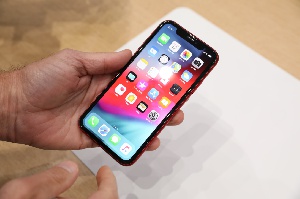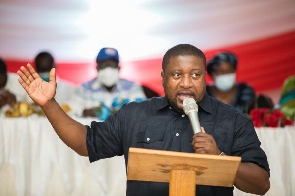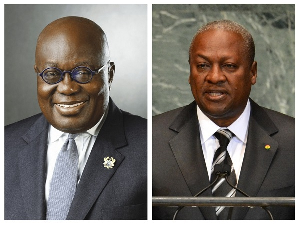It seems we are gradually getting to the end of the crisis that erupted in Cote d’Ivoire following Laurent Gbagbo’s refusal to step down after he lost the presidential election held late last year. I welcome Alassane Ouattara to the high office of President-elect of that country and wish to express the hope that total commitment to respect for human rights and democracy will be his priority so that the huge loss of human life and suffering going back to 2002-03 will not recur.
As I welcome the President-elect, I pose the question whether the NDC Government has a policy for conducting its international affairs. I ask the question because I believe that, if there was a foreign policy, stability in the West Africa sub-region would be an important element of that policy. And if that was the case, Ghana would have been in the fore front of the fight to let democracy prevail in Cote d’Ivoire, not least because Ghana shares a border with that country.
There are a number of reasons why Ghana should have played a leading role in removing Laurent Gbagbo. I will give some of them here. On the other hand, I will not bother to talk about the Government’s “Dzi wo fie asem” (Mind your own business) because it was not even a policy. It was mere attitude. The first reason why Ghana should have taken a lead role is that she, of course. shares a border with Cote d’Ivoire and the crisis there was bound to have serious repercussions here. This is amply demonstrated by the influx of refugees from Cote d’Ivoire to Ghana during the crisis. Ghanaians can only hope that this will not escalate.
The second reason is that the crisis and the suffering were unnecessarily prolonged. This should have been avoided when ECOWAS, with support from the UN and the western world, was prepared to take sharp swift action to remove Gbagbo. The Government must realise that, with the fall of the Union of Soviet Socialist Republics (USSR) and the end of the cold war, America and Britain dominate the world, whether we like it or not. Enter France and Germany and the world is conquered. Therefore, when America and Britain resolved to remove Gbagbo following the lead given by ECOWAS, not to speak of the same position taken by the UN, France, etc, there was no way Gbagbo could have remained in power. The Government, in its usual arrogance, would not accept this logic and swam against the tide. Thus Ghana has suffered a huge setback in its international relations.
The third reason is the overriding need for stability which I have covered in the second paragraph. The fourth reason is that Ghana was in a good strategic position to play a leading part in securing peace in Cote d’Ivoire. I have already mentioned the fact that both countries share a border. ECOWAS had called for the removal of Gbagbo. The President of the ECOWAS Commission which called for the removal of Gbagbo is Mr Gbeho who, prior to being appointed to that post, was a special advisor on foreign affairs to President Atta Mills. In addition, the immediate past Secretary-General of the UN, Kofi Annan, supported the removal of Gbagbo. Therefore, the Government had abundant human resource to draw on and make a case for swift action to be taken if it had heeded the calls from the international community to support the removal of Gbagbo. There was also Nana Akuffo-Addo’s statement issued in January 2011 which gave detailed background to the crisis and made a strong case for Gbagbo’s removal. The statement was incisive because, as Ghana’s Foreign Minister during the earlier crisis in 2002-03, he played a leading role in finding a solution. The NDC Government, in its usual arrogance, appeared to have ignored that statement. As things turned out, at the request of the current UN Secretary-General, French forces gave support to Ouattara’s men to capture Gbagbo to avert further suffering to civilians. It is not clear whether the Secretary-General consulted ECOWAS or the countries that share a border with Cote d’Ivoire before the French forces stormed the presidential palace. If he did, that was proper. If he did not, then it was humiliation for the NDC Government. I fear that the attitude shown by the Government will lead to a situation where Ghana will not matter much in the eyes of the western world and the UN in future. Therefore, I would like to believe that the NDC Government has learnt a lesson from the crisis in Cote d’Ivoire and will review its foreign policy or draw up one accordingly. In a wider context, important events have been occurring in the world that have given a great opportunity for our country to try and reverse the damage that was done by lack of accountability and transparency during the reign of many of our governments. The Bribery Act enacted by the UK Government and the celebrated Mabey and Johnson case are prime examples. I recently read the following about further prosecution in the Mabey and Johnson case in a UK journal: “Directors banned for Iraq contracts
Three executives have been disqualified from being directors for helping to finance Saddam Hussein’s government.
Two former directors and a sales manager of engineering firm Mabey & Johnson have been sentenced for providing kickbacks to the Iraqi government of Saddam Hussein. They inflated the contract price for the supply of steel bridges and disguised illegal payments by channelling them through Jordanian banks. Mr Forsyth, former Managing Director, was sentenced to 21 months’ imprisonment, disqualified from acting as a company director for five years and was ordered to pay prosecution costs of £75,000. Sales Director David Mabey was sentenced to eight months’ imprisonment, disqualified from acting as a Company Director for two years and was ordered to pay prosecution costs of £125,000. Richard Gledhill, former Sales Manager, was sentenced to eight months’ imprisonment, suspended for two years.
Serious Fraud Office Director Richard Alderman said: “This shows that the SFO is determined to go after senior corporate executives who break the law. I am very pleased with the result. It sends out a very strong message from the courts on this type of offending.”
I find it fulfilling to observe that the purpose of the Bribery Act enacted by the UK Government is more to the benefit of developing countries and countries where accountability and transparency are lacking than it is to the UK itself. Therefore, Ghana must grasp the opportunity with both hands. This is an important factor that must be fully taken into account in developing, evaluating and reviewing Ghana’s foreign policy.
Joseph Asante-Yeboah
jasanteyeboah@yahoo.co.uk 28.04.11










